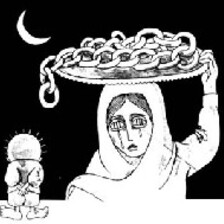East Jerusalem, Palestine 11 June 2002
Israeli tanks are back in Ramallah, and the international media describes it as just another of the ‘almost daily incursions.’ The latest invasion of Jenin a few days ago was explained as a ‘routine patrol.’ The blood-soaked and tear-streaked nightmares of what is happening everyday are blanketed in calm, reasonable language, and the horrors are disguised, turned into something reasonable. The chaos, the madness of bulldozing a house, firing a missile into a bedroom, shooting tank shells down the street is becoming normal; this is just what Israel does. This, for me, is the scariest aspect of the Intifada. It turns things upside down and inside out, it creates a world seen through the looking glass.
Checkpoints, forbidding and impenetrable, dot the West Bank like a contagious rash, while razor wire fences sprawl along the Green line. The Occupied Territories themselves are being carved up into little Bantustans. Yet disguised behind the rhetoric of the increasing need for security they are largely unquestioned. The day to day reality is that thousands of civilians are shut into little pockets, trapped like caged animals: it is a system of Apartheid. People are shot and killed at these checkpoints, but there is always a way around them if you are determined enough. Soldiers watch people take detours to avoid passing through.
It is now normal for Israeli tanks to rumble through Palestinian towns, for helicopter gunships to circle over cities and F-16s to rain down missiles on refugee camps, yet this is spelt out as a perfectly reasonable and balanced response to the ‘terrorism.’ The attacks increase in ferocity as people’s tolerance levels increase, until even the massacre in Jenin refugee camp can be rationalised as a measured response. The world is told that Israel is targeting ‘terrorist infrastructure’ but these are people’s homes, their local shops, their schools and clinics!
One side’s need for security has legitimised the creation of a state of complete insecurity, horror and fear for the other side. But war doesn’t bring about security, it perpetuates terror - the victim’s terror, and the terror of what people will do if you drive them to the edge of despair. I lie in bed listening to the shelling; close my eyes and see an old women being turned back at a checkpoint; try to sleep but remember the woman from Jenin who showed me a picture of her son and asked me how she could find him. And I get angry and sad and wonder what kind of world we are living in.


